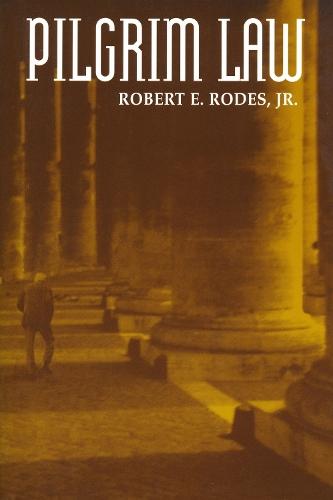Full Product Details
Author: Robert E. Rodes
Publisher: University of Notre Dame Press
Imprint: University of Notre Dame Press
Dimensions:
Width: 15.20cm
, Height: 1.30cm
, Length: 22.90cm
Weight: 0.301kg
ISBN: 9780268038229
ISBN 10: 0268038228
Pages: 277
Publication Date: 15 March 1998
Audience:
College/higher education
,
Professional and scholarly
,
Undergraduate
,
Postgraduate, Research & Scholarly
Format: Paperback
Publisher's Status: Active
Availability: In Print

This item will be ordered in for you from one of our suppliers. Upon receipt, we will promptly dispatch it out to you. For in store availability, please contact us.
Reviews
"""This is a powerful and telling book, instructive on every page, and splendidly lucid throughout. One need not go all the way with Rodes in distinguishing 'natural' from 'pilgrim' law to be grateful for this book's many insights..."" —John Finnis, Oxford “In this eclectic and creative study, Robert Rodes, Jr. of the University of Notre Dame Law School seeks to erect a jurisprudence based on what he understands to be the best insights of liberation theology. Rodes’s work is tightly constructed and passionately argued, surveying a wide range of contemporary religious, political, and legal theory. Throughout, his view is fair, avoiding the polemical dudgeon now so common among legal scholars. . . .Pilgrim Law is a worthwhile study that has much to say to today’s secular princes of politics and policy—for they studiously avoid the transcendent questions it so provocatively engages.” —New Oxford Review “Rodes . . . seeks ‘to present a coherent theory incorporating the principles of liberation theology into Anglo-American jurisprudence.’ His chief sources are Gustavo Gutiérrez and some major documents of the Catholic Church. He describes pilgrim law as a law based on Christian eschatology, the jurisprudential manifestation of the theology of liberation. He emphasizes class differences, the preferential option for the poor, and the role of the church in society, illustrating them with many concrete examples.” —Theology Digest “Rodes makes intelligent applications of ideas from liberation theology and Vatican II. An insightful and must-read book for those interested in the relation between law and justice.” —Religious Studies Review"
This is a powerful and telling book, instructive on every page, and splendidly lucid throughout. One need not go all the way with Rodes in distinguishing 'natural' from 'pilgrim' law to be grateful for this book's many insights... -John Finnis, Oxford In this eclectic and creative study, Robert Rodes, Jr. of the University of Notre Dame Law School seeks to erect a jurisprudence based on what he understands to be the best insights of liberation theology. Rodes's work is tightly constructed and passionately argued, surveying a wide range of contemporary religious, political, and legal theory. Throughout, his view is fair, avoiding the polemical dudgeon now so common among legal scholars. . . .Pilgrim Law is a worthwhile study that has much to say to today's secular princes of politics and policy-for they studiously avoid the transcendent questions it so provocatively engages. -New Oxford Review Rodes . . . seeks 'to present a coherent theory incorporating the principles of liberation theology into Anglo-American jurisprudence.' His chief sources are Gustavo Gutierrez and some major documents of the Catholic Church. He describes pilgrim law as a law based on Christian eschatology, the jurisprudential manifestation of the theology of liberation. He emphasizes class differences, the preferential option for the poor, and the role of the church in society, illustrating them with many concrete examples. -Theology Digest Rodes makes intelligent applications of ideas from liberation theology and Vatican II. An insightful and must-read book for those interested in the relation between law and justice. -Religious Studies Review
Author Information
Robert Rodes is a Paul J. Schierl/Fort Howard Corporation Professor of Legal Ethics at University of Notre Dame Law School.



